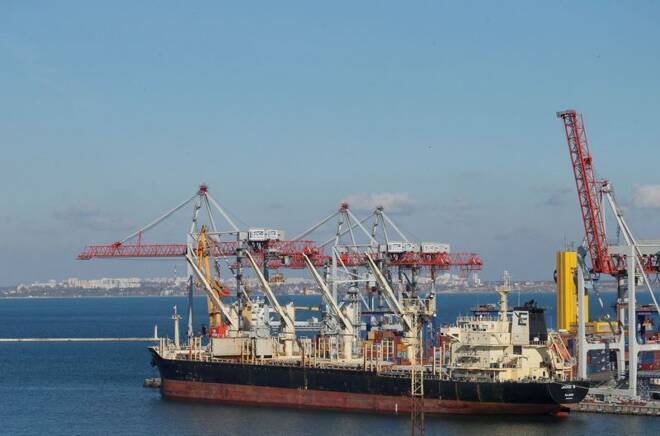Advertisement
Advertisement
Ukraine says grain on ships in blocked Black Sea ports may deteriorate
By:
KYIV (Reuters) - Around 1.25 million tonnes of grains and oilseeds are still on commercial vessels blocked in Ukrainian seaports due to Russia's invasion and part of the cargo may deteriorate in the near future, Ukraine's farm minister was quoted as saying on Friday.
KYIV (Reuters) – Around 1.25 million tonnes of grains and oilseeds are still on commercial vessels blocked in Ukrainian seaports due to Russia’s invasion and part of the cargo may deteriorate in the near future, Ukraine’s farm minister was quoted as saying on Friday.
Ukraine used to export almost all its grain and oilseeds via seaports and now is forced to find new routes as its ports are blocked.
Before the war, Ukraine exported up to 6 million tonnes of grain and oilseed a month, while in March the exports fell to 200,000 tonnes, Mykola Solskyi told the newspaper Ukrayinska Pravda.
“It (the cargo) is not unloaded, and is still on vessels. There are currently 57 vessels with 1.25 million tonnes of grain and oilseeds,” Solskyi said.
“As for the retention period, I think that even the captains themselves in most cases do not know if there are any problems with this. They certainly did not plan to keep this grain on the ships for a long time,” he added.
Solskyi said that everything depended on the condition of the holds of the vessels and if the grain is stored for more than three months, “problems arise and part of the cargo can be spoiled.”
Ukraine traditionally exports grains to the north Africa and the Middle East and Solskyi said these regions would be forced to spend more money and focus on wheat from non-Ukraine origins.
He said importers were already spending more and the situation with grain supply from Ukraine could push these countries to build greater grain reserves and this would also drive up prices.
“That is, even if this story ended magically tomorrow, the wave of high prices will be another 3 to 5 years, until the mood levels off, and there will be no balance,” Solskyi added.
(Reporting by Pavel Polityuk; editing by David Evans)
About the Author
Reuterscontributor
Reuters, the news and media division of Thomson Reuters, is the world’s largest international multimedia news provider reaching more than one billion people every day. Reuters provides trusted business, financial, national, and international news to professionals via Thomson Reuters desktops, the world's media organizations, and directly to consumers at Reuters.com and via Reuters TV. Learn more about Thomson Reuters products:
Did you find this article useful?
Latest news and analysis
Advertisement
